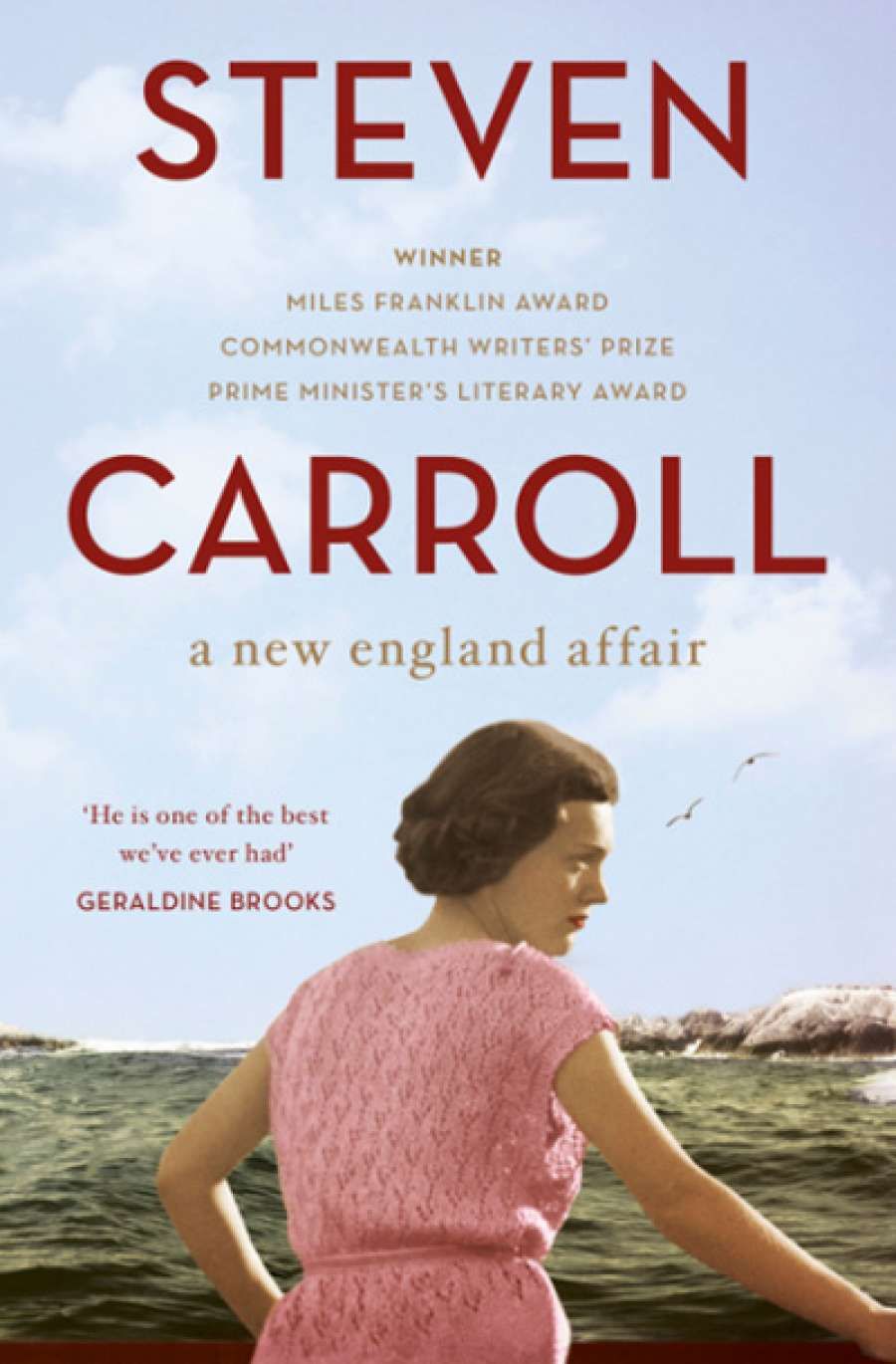
- Free Article: No
- Contents Category: Fiction
- Custom Article Title: Patrick Allington reviews 'A New England Affair' by Steven Carroll
- Review Article: Yes
- Online Only: No
- Book 1 Title: A New England Affair
- Book 1 Biblio: Fourth Estate, $29.99 pb, 228 pp, 9781460751091
While Eliot’s fame, his failed first marriage, and his particular approach to work and life hang over everything, Emily is at the heart of this story. She is, at various times, ‘difficult’, ‘jumpy’, ‘broken’. But she is also resilient, as solid as her car. We see her as a spirited young woman who aspires to the stage; we see her waiting (and waiting and waiting) for a different type of relationship with Tom; we see an old woman who teaches acting and singing to a new generation of girls and women: ‘You young people, with your freedoms and your love bites.’ Although this is a novel about companionship, Emily comes most fully to life when she is physically apart from Eliot: teaching and influencing ‘her girls’; standing on a fishing boat in rough seas, on a personal mission; silently and devastatingly admonishing a young man for a misdeed.
Eliot, meanwhile, inhabits the story like a reticent ghost: he is ‘Tom, not quite real’. While he is by no means a repellent character, he frequently comes across as an empathy-free zone, willing to hide behind his fame and his straitjacketed religious and moral beliefs. At one point Emily ponders, ‘How many Toms were there? A Tom within a Tom within ... And did anybody ever get to glimpse the real Tom? Did she?’
At times, the portrait of Emily and Tom’s complex bond is tender, their version of love authentic precisely because of its awkwardness. But at other times it is excruciating to watch them circle each other, each playing a predetermined role. Whenever Emily loses patience – whether with Tom or with the gendered and mannered world that she inhabits – it’s hard to do anything other than cheer.
 Steven CarrollThe reader faces choices when reading A New England Affair. There is a temptation, at times encouraged by the way Carroll frames the story, to seek out Four Quartets and other Eliot works, collections of his letters, biographies, and literary analyses. (Carroll’s accompanying essay about his research sometimes heightens this effect, but sometimes reminds the reader of the importance of speculation). Underlying this are questions such as ‘how true is this story?’, ‘how real are these characters?’, and ‘where is Emily in the poems?’ In such moments, it seems as if a fascination with Eliot the real person, and perhaps even a reverence for his writing and publishing life, is a prerequisite for complete absorption into what is ultimately a fictional story. But to focus on historical or literary contexts is to obscure the point of the novel, which is to ponder ‘the lives we live and the lives we don’t’.
Steven CarrollThe reader faces choices when reading A New England Affair. There is a temptation, at times encouraged by the way Carroll frames the story, to seek out Four Quartets and other Eliot works, collections of his letters, biographies, and literary analyses. (Carroll’s accompanying essay about his research sometimes heightens this effect, but sometimes reminds the reader of the importance of speculation). Underlying this are questions such as ‘how true is this story?’, ‘how real are these characters?’, and ‘where is Emily in the poems?’ In such moments, it seems as if a fascination with Eliot the real person, and perhaps even a reverence for his writing and publishing life, is a prerequisite for complete absorption into what is ultimately a fictional story. But to focus on historical or literary contexts is to obscure the point of the novel, which is to ponder ‘the lives we live and the lives we don’t’.
A New England Affair benefits from sitting beside its two companion novels, particularly The Lost Life, which focuses on Tom and Emily’s time together in the Cotswolds in 1934. I am not suggesting that the new novel cannot be read independently. But thinking of all three novels as parts of a whole makes the characters richer and, especially, adds to the poignant way that Carroll addresses the passage of time, including the anchoring event of World War II.
Carroll’s Four Quartets series is not the equal of his Glenroy series, about Melbourne suburbia and the world. In part, that is because Carroll has made such fine use of the characters of Rita, Vic, and Michael from the Glenroy novels, creating a family saga that celebrates and interrogates life, including the everyday, without descending into triteness. There are plenty of moments of celebration and interrogation – especially interrogation – in A New England Affair. But there are also times when the juxtaposition of T.S. Eliot the famous poet and Tom the private person becomes a little wearying and repetitive. And there are times when I pined for less of Tom and more of Emily.


Comments powered by CComment